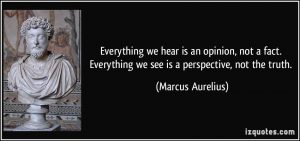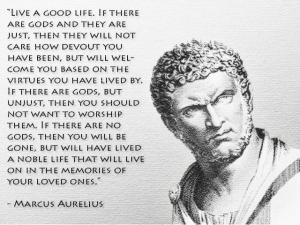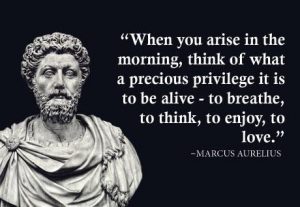There has been a great surge of interest in Stoicism over the past few years. This interest has manifested itself primarily in online communities. Many members new to these communities are very excited to learn more about and share their knowledge of Stoicism. One popular way to share wisdom on the Internet, is to take a quote that you like, slap it onto a landscape image, and then share it with everyone on Instagram.
In their excitement, many people new to Stoicism end up sharing these various quotes and phrases, thinking that the Stoics such as Marcus Aurelius, Seneca, and Epictetus have indeed said all of them. But very often, this is actually not the case. Many of these misattributed quotes seem fairly close to what these Stoics may have said at first glance, but they often do not hold up to closer scrutiny.
From what I have seen in my own participation within the online Stoic communities, Marcus Aurelius appears to be the poster child for misattributed quotes. Here, we are going to look at some of the most popular quotes that are typically misattributed to Marcus Aurelius, try to figure out where they may have come from, and determine how we might go about distinguishing real quotes from fake ones in the future.
Let’s take a look at the first one.

From what I have seen, this is by far the most prolific quote that is often misattributed to Marcus Aurelius. This quote appears to be denying that there is an objective reality, and is instead endorsing an anything goes subjective view of the world. Marcus and the Stoics certainly would not of endorsed this kind of view. But then, where could this quote have come from? If we look inside of Meditations, we can find some passages that have interesting parallels to the quote in question.
In Meditations 2.15 Marcus says the following:
Everything is what you suppose it to be. For the words that were addressed to the Cynic Monimus are clear enough, and clear too, the value of that saying, if one accepts its inner meaning, so far as it is true.
The first part of this passage, “Everything is what you suppose it to be” sounds an awful lot like the quote we were looking at originally which started off by saying “Everything we hear is an opinion, not a fact.” However, there is a lot of extra context to our passage in Meditations. Who is the Cynic Monimus? This is why having a translation with good footnotes is often important.
In the Robin Hard translation, it notes that Monimus was a Cynic philosopher in the 4th Century BCE who is supposed to have originally said “Everything is what you suppose it to be”. These words were also retorted back to him to show that they are self refuting.
Back in Meditations, Marcus says that these words are “clear and valuable if you accept their inner meaning so far as they are true”. So Marcus is saying here to not take these words literally, but to take their inner meaning. What is this inner meaning? If we read through more of Meditations is starts to become clear.
Do away with the judgement, and the notion ‘I have been harmed’ is done away with; do away with that notion, and the harm itself is gone. – Meditations 4.7
If you suffer distress because of some external cause, it is not the thing itself that troubles you but your judgement about it, and it is within your power to cancel that judgement at any moment. But if what distresses you is something that lies in your own disposition, who is to prevent you from correcting your way of thinking? – Meditations 8.47
From these two passages we can see what Marcus is really saying. That it is not things in themselves that cause us distress, but rather, our judgements that these things are bad which cause us distress. But we have control over our judgements, so we have control over what we consider to be harmful or not. It is in this way that “Everything is as you supposed it to be”.
But this is not to say that all judgements are equally valid, or that we should merely change all of our judgements so that we never think we are harmed by anything at all. This idea isn’t so clear from Meditations alone. We need to actually go to Epictetus, who Marcus Aurelius also drew many of his own thoughts from.
In Epictetus’s Discourses 2.11.13 it says:
Look now, this is the starting point of philosophy: the recognition that different people have conflicting opinions, the rejection of mere opinion so that it comes to be viewed with mistrust, and investigation of opinion to determine whether it is rightly held, and the discovery of a standard of judgment, comparable to the balance that we have devised for the determining of weights, or the carpenter’s rule for determining whether things are straight or crooked.
Epictetus here is explicitly saying that opinion and judgement can be rightly or wrongly held, so there is a correct standard by which to weigh these things. What is that standard by which we can weight these things? For the Stoics the standard is ‘reason’.
This becomes even more clear in one of Seneca’s letters where he says:
Reason then, is the arbiter of what is good and bad, and reason holds cheap whatever is external and not its own. Those things which are neither good nor bad are in its judgement very small and trivial additions; for as far as reason is concerned, every good is in the mind. – Letters to Lucilius 66.35
So reason allows us to form correct judgements about what is good or bad. Whatever is external to us for the Stoics, can neither be good nor bad. Our judgements may tell us that external things are good or bad, but these are incorrect judgements that need to be corrected. We often think we are harmed when actually we are not.
So, if we go back to the original quote we were looking at: “Everything we hear is an opinion, not a fact. Everything we see is a perspective, not the truth.”
We can see that:
1. Taken literally, as it often is, this is a self refuting statement, much like that statement that was said by Monimus the Cynic and mentioned by Marcus in Meditations.
2. It conflicts with the idea that the Stoics had, that reason can objectively decide whether an opinion or judgement is correct or not. Based on all of this, I think it is safe to say that this quote is now fully debunked.
Let’s take a look at another one.

The first thing that is interesting to note here is that this is not a picture of Marcus Aurelius, or at least, not the Marcus Aurelius that wrote Meditations. This is an image of Emperor Caracalla who ruled about 20 years after Marcus Aurelius did. Interestingly enough, Caracalla was just his nickname, his full name was originally Lucius Septimius Bassianus, but he was actually renamed Marcus Aurelius Antoninus at the age of seven as part of his father’s attempt at union with the families of Antoninus Pius and Marcus Aurelius. So the mistake here actually makes some sense. Whoever created this image just got their Marcuses mixed up.
The quote itself is very agnostic or atheistic in its overall tone. It admits that if the gods exist they may or may not be unjust towards humans, and also admits that they may not exist at all. It seems to hold all potential options as equal in probability and to be of equal weight. However, in general this is not in line with ancient Stoic thinking. The vast majority of ancient Stoics were very pious, believing that the Universe itself was equivalent to God.
If we look through Meditations, we can find a passage, 2.11 that on the surface, appears to be very similar to the quote in question, but at a deeper level, it is very different.
Let your every action, word, and thought be those of one who could depart from life at any moment. But taking your leave of the human race is nothing to be feared, if the gods exist; for they would not involve you in anything bad. If, on the other hand, they do not exist, or if they do not concern themselves with human affairs, why should I care to go on living in a world devoid of gods or devoid of providence?
But they do exist, and they do show concern for human affairs, and they have placed it wholly within the power of human beings never to fall into genuine evils; and besides, if anything were bad for us, they would have taken measures too to ensure that everyone would have it in his power not to fall victim to it.
Here Marcus gives us a very different perspective from our aforementioned quote. Marcus is saying that if the gods do exist, they would care for us and not involve us in anything bad, and if they do not exist we should question whether or not it is even worth living in a world that is devoid of them and providence. Marcus then affirms that the gods do in fact exist, and that they have given us the tools to not fall victim to true evils.
Now in other parts of the Meditations, Marcus does bring up the question of if the Gods exist or whether the universe is just atoms swerving randomly in the void as the Epicureans believed, but Marcus always comes back to the point that either way, whatever is true, it should not change how you behave, that you should be virtuous regardless for it’s own sake.
The last part of our quote in question is actually the most uncharacteristic portion where it says: “If there are no gods, then you will be gone, but will have lived a noble life that will live on in the memories of your loved ones.”
Marcus frequently rejects the idea that living on in the memories of others is a valid basis for ethical action.
Close is the time when you will forget all things; and close, too, the time when all will forget you. – Meditations, 7.21
Turn it inside out, and see what sort of thing it is, and what becomes of it when it grows old, or falls sick or into distress. Short is the life of both praiser and praised, and of the one who remembers and the one who is remembered; and this comes about in just a corner of one region of the world, and not even there are all in accord, nor indeed is anyone in accord with himself, and the earth as a whole is but a point in the universe. – Meditations, 8.21
One who feels a passionate desire for posthumous fame fails to recognize that everyone who remembers him will die very swiftly in his turn, and then again the one who takes over from him, until all memory is utterly extinguished as it passes from one person to another and each in succession is lit and then snuffed out. And supposing for the sake of argument that those who will remember are indeed immortal, and the remembrance is immortal, what is that to you? I hardly need say that praise means nothing to the dead; but what does it mean to the living, unless, perhaps, it serves some secondary purpose? For you are rejecting inopportunely the gift that nature grants to you in the present, and are setting your mind on what others may say of you. – Meditations, 4.19
So from this, we can seem that Marcus deemed fame, praise, and the memory of others as an insignificant and trifling thing. We have again shown how this quote is an incorrect interpretation of what Marcus Aurelius actually said and thought.
There is one last quote often attributed to Marcus that I would like to cover, and it is this one.

First off, for anyone who is familiar with the content of Marcus’s Meditations, they can almost immediately tell that this is certainly far too positive a statement for Marcus to of written. The tone here should make you suspicious right away. Marcus is much more at home saying things such as:
You are a little soul carrying a corpse around, as Epictetus used to say. – Meditations, 4.41
Or:
When you have savouries and fine dishes set before you, you will gain an idea of their nature if you tell yourself that this is the corpse of a fish, and that the corpse of a bird or a pig; or again, that fine Falernian wine is merely grape-juice, and this purple robe some sheep’s wool dipped in the blood of a shellfish; and as for sexual intercourse, it is the friction of a piece of gut and, following a sort of convulsion, the expulsion of some mucus. Thoughts such as these reach through to the things themselves and strike to the heart of them, allowing us to see them as they truly are. – Meditations 6.13
The most similar passage to our new quote in question is from 5.1:
Early in the morning, when you find it so hard to rouse yourself from your sleep, have these thoughts ready at hand: ’I am rising to do the work of a human being. Why, then, am I so irritable if I am going out to do what I was born to do and what I was brought into this world for?
After a little bit of digging online, you can actually find that our quote is first attributed to Marcus Aurelius in a journal from 1913 called The Fra: For Philistines and Roycrofters, Volume 12, which is full of positive affirmations from various sources. The quote is not properly cited in that text, so at this point it is pretty safe to say that Marcus Aurelius did not say this quote either.
Finally to summarize, based on what we have learned, here are five rules of thumb you can use the next time you find a quote posted on the Internet that is attributed to a famous Stoic philosopher.
1. If there is no citation in the quote of where it specifically came from, be suspicious.
2. If it sounds like it endorses full blown relativism, be suspicious.
3. If it contains the image of a character that you do not recognize, be suspicious.
4. If it sounds very agnostic or atheistic in tone, be suspicious.
5. If it sounds like modern day positive thinking, be suspicious.
But does any of this even matter? Why should we care about whether these quotes that are often attributed to Marcus Aurelius are accurate or not?
Well on the one hand, these quotes do not correctly portray what Marcus and the Stoics thought in general. People who are just getting into and learning about Stoicism for the first time will take these as accurate representations, and attain an inaccurate image of what the Stoics were trying to say.
The Stoics were very concerned with understanding what was true, as they believed that knowing what was true or correct was crucial in order for one to live a good life. So it seems only fair that we try and represent their opinions as accurately as possible.
On the other hand, just because the Stoics did not say these things does not mean that these quotes are not valuable, or helpful. Perhaps these quotes in question even contain some truth of their own.
One of Seneca’s more popular sayings highlights this point well:
What then? Shall I not follow in the footsteps of my predecessors? I shall indeed use the old road, but if I find one that makes a shorter cut and is smoother to travel, I shall open the new road. Men who have made these discoveries before us are not our masters, but our guides. Truth lies open for all; it has not yet been monopolized. And there is plenty of it left even for posterity to discover. – Letters to Lucilius, 33.10
The source of these quotes does not matter as much as whether they are true or not, as the truth is what can help us to live a better life.
Thomas Colligan is a Software Engineer and a practicing Stoic living in NYC. His interests include technology, philosophy, and finding wisdom wherever he can. He was also inspired by Cicero’s archer metaphor in De Finibus to practice archery, and may even pretend he is good at it sometimes.



The problem with Internet quotes is that you can’t always depend on their accuracy.
https://i.pinimg.com/736x/20/86/37/208637469390af1d181a0ef55d867a99–internet-quotes-the-internet.jpg
Good article on a real problem resulting from Stoicism as a fashion – blather instead of actual reading on the part of people posting. Thanks, Thomas.
very timely. In particular the items on “relativism” and “atheism” as red flags for wrong quotes
[…] time scale of deep space, and the small amount of time we carry Earth. Go to this website marcus aurelius quotes give a man a fish quote. Accept the truth that you might shed things in your life. Things are regularly transforming as […]